Table of Contents
In the world of games like Cyberpunk 2077, titles such as Cloudpunk, Syndicate, Shadowrun Returns, Citizen Sleeper, the System Shock Remake, and many more all bring unique takes to the cyberpunk genre. From flying cars and mind-bending mechanics to futuristic arsenals and dice-based outcomes, each game explores its distinct narrative and gameplay elements. That is why I have listed here 15 top games that are similar to Cyberpunk 2077 that you should play in 2023.
Key Takeaways
- Games Like Cyberpunk 2077 offer a futuristic, dystopian setting, filled with advanced technology, mega-corporations, and RPG elements.
- These titles frequently include elements of role-playing, giving players a wide range of customization options for their characters and equipment.
- Many games in the genre feature open-world exploration, allowing players to experience vast, immersive environments filled with diverse characters and cultures.
- These games often involve decision-making that can influence the narrative, with branching dialogue systems and choices that can affect the storyline.
- Each game comes with its own set of challenges and opportunities, making each one more or less like Cyberpunk 2977 but still reflecting a unique perspective in its approach.
Games Like Cyberpunk 2077 To Play In 2023
Here is an overview of the games that are similar to Cyberpunk 2077:
| Serial No. | Game Title | Similarities to Cyberpunk 2077 | Best Features | Developer | Release Date |
|---|---|---|---|---|---|
| 1 | Cloudpunk | Open-world, Cyberpunk setting | Unique voxel art style, narrative-driven | Ion Lands | April 23, 2020 |
| 2 | Syndicate | Cybernetic enhancements, dystopian setting | Tactical gameplay, immersive story | Starbreeze Studios | 21 February 2012 |
| 3 | Shadowrun Returns | Cyberpunk setting, RPG elements | Deep storytelling, turn-based combat | Harebrained Schemes | July 25, 2013 |
| 4 | Citizen Sleeper | Role-playing, dystopian future setting | Decision-based gameplay, multiple endings | Jump Over the Age | 5 May 2022 |
| 5 | System Shock Remake | First-person perspective, futuristic setting | Updated graphics, improved controls | Nightdive Studios | May 30, 2023 |
| 6 | Disco Elysium | Branching dialogues, RPG elements | Complex dialogue system, non-combat focus | ZA/UM | 15 October 2019 |
| 7 | The Ascent | Cyberpunk setting, twin-stick shooter mechanics | Co-op play, detailed environments | Neon Giant | 29 July 2021 |
| 8 | Ghostrunner | Cyberpunk setting, first-person perspective | Fast-paced parkour, challenging gameplay | One More Level, Slipgate Ironworks | 27 October 2020 |
| 9 | Deus Ex: Mankind Divided | Cybernetic enhancements, RPG elements | Branching story, choice and consequence mechanics | Eidos-Montréal | August 23, 2016 |
| 10 | Dex | Cyberpunk setting, 2D side-scrolling | Hand-drawn art, non-linear gameplay | Dreadlocks Ltd | May 7, 2015 |
| 11 | Observer: System Redux | Cyberpunk setting, first-person perspective | Enhanced visuals, horror elements | Bloober Team, Anshar Studios | 10 Nov, 2020 |
| 12 | Witcher 3 | Open-world, complex narrative | Rich world-building, side quests | CD Projekt Red | 19 May 2015 |
| 13 | Bioshock | First-person perspective, dystopian setting | Atmospheric storytelling, unique powers | 2K Boston, 2K Australia | August 21, 2007 |
| 14 | Dishonored 2 | First-person perspective, choice and consequence mechanics | Stealth gameplay, multiple play styles | Arkane Studios | 11 November 2016 |
| 15 | The Elder Scrolls V: Skyrim | Open-world, RPG elements | Character creation, expansive lore | Bethesda Game Studios | November 11, 2011 |
15. Cloudpunk

| Developer | Release Date |
|---|---|
| Ion Lands | April 23, 2020 |
When placed alongside Cyberpunk 2077, Cloudpunk presents an interesting parallel in the realm of futuristic, open-world RPGs. Like Cyberpunk 2077, Cloudpunk offers a first-person exploration experience in a sprawling, neon-lit cityscape, though its focus on HOVA (flying car) maneuvering introduces a distinct verticality not found in the streets and alleys of Night City.
Similarly, Cloudpunk uses a branching dialogue system and narrative choices that echo Cyberpunk 2077’s approach, but Cloudpunk leans heavily into dialogue and exploration, contrasting with Cyberpunk 2077’s more combat-focused core mechanics.
Cloudpunk’s story content, however, offers a lighter counterpoint to Cyberpunk 2077’s darker narrative. Its charming, quirky characters and semi-legal delivery missions provide a refreshing change of pace, though the uneven quality of the writing and voice acting may be a point of contention for players seeking the narrative depth and polish of Cyberpunk 2077.
Furthermore, while Cloudpunk’s semi-legal delivery jobs and optional side quests can draw parallels to the fixer missions in Cyberpunk 2077, it misses the mark in terms of robust gameplay options and character customization. Lastly, Cloudpunk lacks the mature themes and edgier aesthetic choices that define Cyberpunk 2077, making it a more accessible, if less intense, entry into the genre.
Pros
- Unique vertical exploration with HOVA
- Light-hearted story and charming characters
- Emphasizes dialogue and exploration
- Accessible for wider audiences
Cons
- The uneven quality of writing and voice acting
- Limited gameplay mechanics and customization
- Less in-depth worldbuilding
- Misses the intense, mature themes of Cyberpunk 2077
14. Syndicate

| Developer | Release Date |
|---|---|
| Starbreeze Studios | February 21, 2012 |
Games like Cyberpunk 2077 often provide an immersive, dystopian environment for players to explore. and Syndicate is one of those titles. Syndicate, unlike its original game series, is now a first-person shooter set in 2069, and despite the close temporal proximity, it displays both similarities and differences when compared to the dynamic world of Cyberpunk 2077. Similar to Cyberpunk, players control an augmented agent, Miles Kilo, reminiscent of Cyberpunk’s mercenary V, navigating through a world defined by corporate dominance and deceit.
Like Cyberpunk 2077’s Legendary weapons, Syndicate is characterized by intensive combat gameplay, presenting an array of weapons, ranging from conventional firearms to futuristic arsenals that can be upgraded and customized. However, where Cyberpunk provides a tier system for equipment rarity and four types of damage,
Syndicate instead focuses on the unique “breaching” mechanics, which offer the opportunity to manipulate the minds of enemies – an innovative gameplay element not found in Cyberpunk.
Syndicate’s world, though dominated by corporations as is Cyberpunk’s Night City, does not exhibit the same vivid, detailed open-world experience filled with distinct regions and vibrant NPCs. Syndicate’s lack of non-English speaking characters and the culturally diverse world Cyberpunk is renowned for is palpable.
Furthermore, Syndicate does not feature a competitive multiplayer mode, opting instead for a cooperative multiplayer campaign. In contrast, Cyberpunk’s vast single-player campaign is its primary focus, offering extensive exploration and dynamic quest choices that influence the title’s conclusion.
Pros
- The unique “breaching” mechanic adds a fresh gameplay element
- Cooperative multiplayer mode encourages teamwork
- Customizable weapons provide strategic gameplay opportunities
Cons
- No competitive multiplayer mode
- A less immersive world compared to Cyberpunk
- Fewer gameplay choices impact story outcomes
13. Shadowrun Returns

| Developer | Release Date |
|---|---|
| Starbreeze Studios | February 21, 2012 |
In an industry dominated by games like Cyberpunk 2077, Shadowrun Returns takes a novel approach by fusing together elements of cyberpunk aesthetics with classic high fantasy lore. Where Cyberpunk 2077 deploys a first-person perspective in the futuristic Night City, Shadowrun Returns incorporates the fantastical elements of elves, dwarves, orcs, trolls, and humans in a vibrant, interactive universe, played in turn-based combat style.
The character customization in both games is fairly detailed, but the distinction lies in the role-playing system as they are crucial in titles like Cyberpunk 2077. Cyberpunk 2077’s classes—NetRunner, Techie, Solo—pale in contrast to the six distinctive archetypes of Shadowrun Returns, including street samurai, mages, deckers, shamans, riggers, and physical adepts. Both games provide various options for upgrading characters and enhancing abilities.
Much like Cyberpunk 2077’s sprawling Night City, Shadowrun Returns’s world is subject to exploration. However, the latter offers more environmental interaction, like object manipulation or hacking terminals to unlock secret rooms.
Shadowrun Returns also introduces the ‘Matrix,’ a parallel realm, accessed by deckers, echoing Cyberpunk 2077’s “Braindance.” Nevertheless, Shadowrun Returns’s tactical turn-based combat and spirit summoning distinguish it from the fast-paced gunplay and cyberdecks of Cyberpunk 2077.
Pros
- A unique blend of cyberpunk and high fantasy elements
- More detailed character archetypes
- Greater environment interaction
- Tactical turn-based combat encourages strategy
Cons
- Linear gameplay might not appeal to all
- Limited exploration compared to open-world games
- Balancing between combat, magic, and drone capabilities can be complex
- The potential hostility of summoned spirits could add unwanted difficulty
12. Citizen Sleeper

| Developer | Release Date |
|---|---|
| Jump Over the Age | May 5, 2022 |
Citizen Sleeper shares certain elements with Cyberpunk 2077, particularly the theme of struggling in a dystopian future under the control of mega-corporations. Both games have strong cybernetic themes; however, the cybernetic aspect in Citizen Sleeper is integrated more deeply into the character’s survival, requiring meticulous management to maintain the protagonist’s robotic body.
While both games feature a variety of decision-making and customization options, they differ significantly in gameplay mechanics. Combat mechanics in games like Cyberpunk 2077 vary significantly, offering different levels of challenge. There are tons of options for character progression with a wealth of skills, weapons, and cybernetic enhancements. In contrast, Citizen Sleeper employs a dice-based system to decide outcomes, creating a more game-of-chance mechanic.
In terms of narrative, Citizen Sleeper presents a plot that is influenced directly by the player’s actions and decisions, which seems to provide more emphasis on the player’s influence over Citizen Sleeper’s world compared to Cyberpunk 2077, where side quests appear to be the strongest element of the narrative.
As for the characters, Cyberpunk 2077 offers companions for aid and interaction, while Citizen Sleeper presents a cast representing various factions for the player to negotiate with, which could potentially offer a more varied narrative experience.
Pros
- Greater emphasis on player decisions affecting the plot
- A unique dice-based gameplay mechanic
- Survival aspects provide a challenge
Cons
- Potentially less control due to reliance on chance
- Less varied combat and action
- Fewer customization options compared to Cyberpunk 2077
11. System Shock Remake
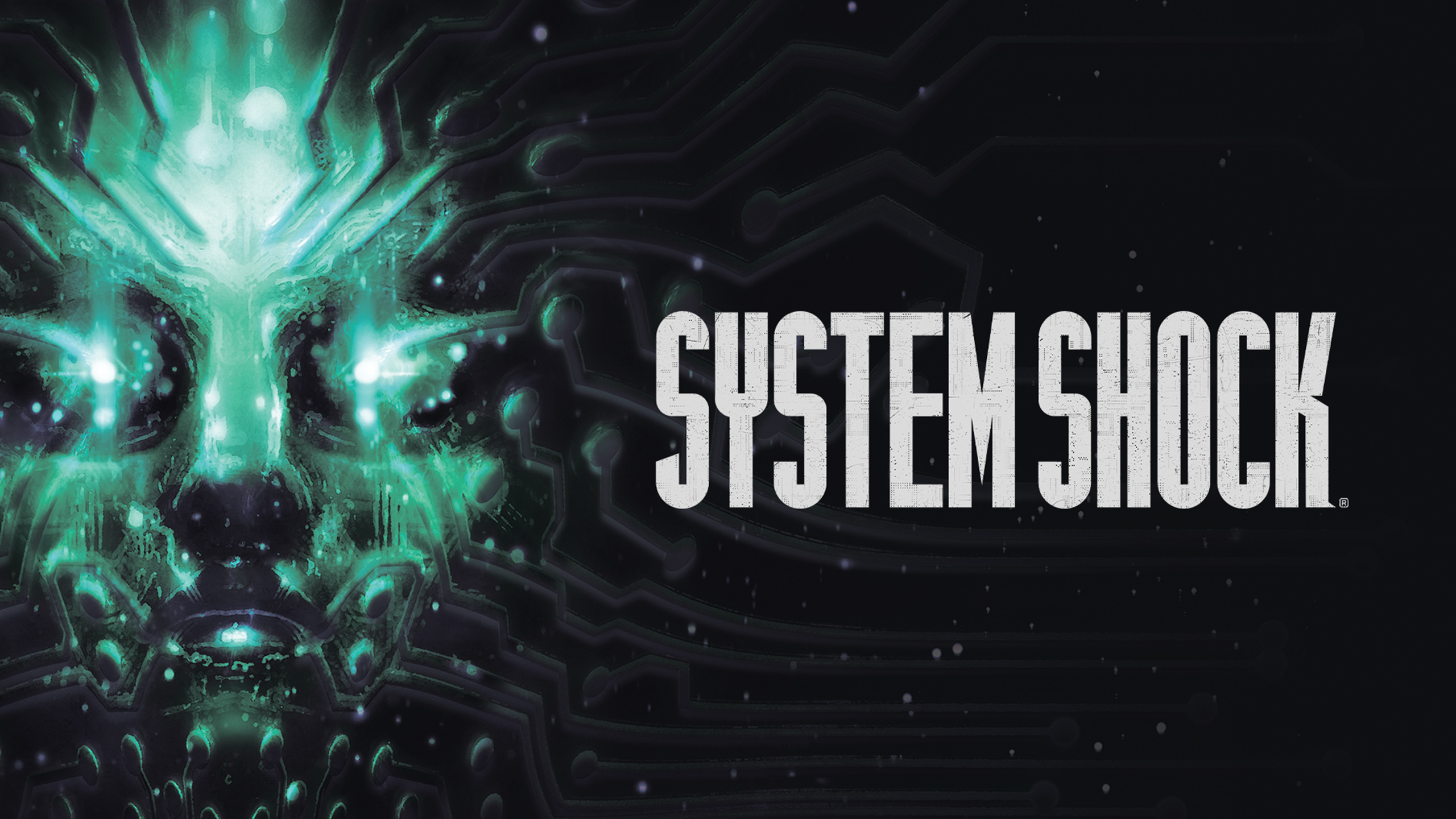
| Developer | Release Date |
|---|---|
| Nightdive Studios | May 30, 2023 |
Diving into the realm of the System Shock remake, one can discern certain similarities to Cyberpunk 2077, especially in terms of the dystopian settings and the critical role of futuristic technology. Both games are situated in grim, cybernetic reality, and expose players to engaging combat, the latter of which is more customizable in the System Shock remake.
The System Shock remake offers adjustable difficulty settings across four game aspects, something that might appeal to players who found Cyberpunk’s difficulty level invariable. Yet, the option of being a non-lethal player that Cyberpunk offers is missed in the System Shock remake.
The System Shock remake also incorporates a survival aspect, demanding strategic stealth tactics from players, which may interest Cyberpunk players seeking additional challenges. Additionally, System Shock Remake employs a respawn mechanic that motivates exploration but also avoids unnecessary frustration, presenting a nuanced design element absent in Cyberpunk.
However, System Shock Remake falls short in character movement and flexibility compared to Cyberpunk 2077. The inability to execute actions like ladder sliding and the need to crouch-jump are somewhat archaic. Furthermore, while Cyberpunk 2077’s cyberware is an integral part of gameplay, the System Shock remake’s cyberspace sections might feel monotonous and aesthetically outdated.
Pros
- Adjustable difficulty settings across multiple aspects
- Unique enemy designs require different strategies
- Convenient respawn mechanics promoting exploration
- Enhanced weapon variety compared to the original game
Cons
- Outdated character movements
- Potentially boring cyberspace sections
- Stealth play is necessary, but might not suit all players
- Lack of character customization options compared to Cyberpunk 2077
10. Disco Elysium
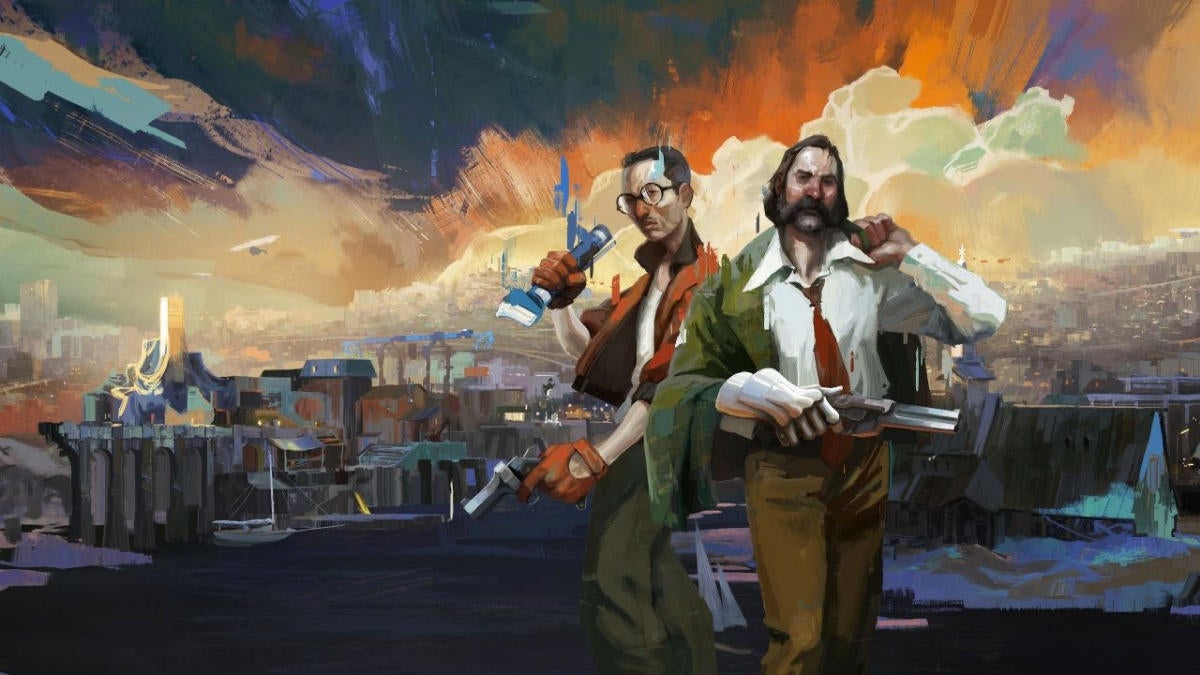
| Developer | Release Date |
|---|---|
| ZA/UM | October 15, 2019 |
Comparing Disco Elysium with Cyberpunk 2077, it’s evident both games have a few overlapping areas, yet exhibit unique personalities in their gameplay. Both games emphasize an open-world experience with a strong emphasis on role-playing elements. However, the execution of these elements varies significantly.
In contrast to the customizable V in Cyberpunk 2077, Disco Elysium introduces a protagonist suffering from substance-induced amnesia, resulting in a distinct narrative starting point. While Cyberpunk 2077 focuses on high-octane combat, cybernetic enhancements, and exploration, Disco Elysium replaces combat with skill checks and dialogue trees. That is why games like Cyberpunk 2077 allow extensive character and equipment customization.
Disco Elysium also diverges from Cyberpunk 2077 in its mechanics. Where Cyberpunk 2077 uses a complex tier-based equipment system with extensive legendary cyberware customization, Disco Elysium relies on a unique “Thought Cabinet” system and 24 distinct secondary skills, which intertwine with dialogue options and character development.
Moreover, while Cyberpunk 2077 offers a technologically advanced, futuristic setting rife with inequality and corporate rule, Disco Elysium opts for a more rustic, dilapidated environment where your choices feel less tied to societal critique and more to the protagonist’s psyche.
Pros
- Unique dialogue-driven gameplay
- Innovative “Thought Cabinet” system
- Exploration of character psyche
Cons
- The lack of traditional combat may be off-putting for some
- Certain mechanics can lead to self-destructive behaviors
- The setting might be bleak for players who prefer a more vibrant world
9. The Ascent
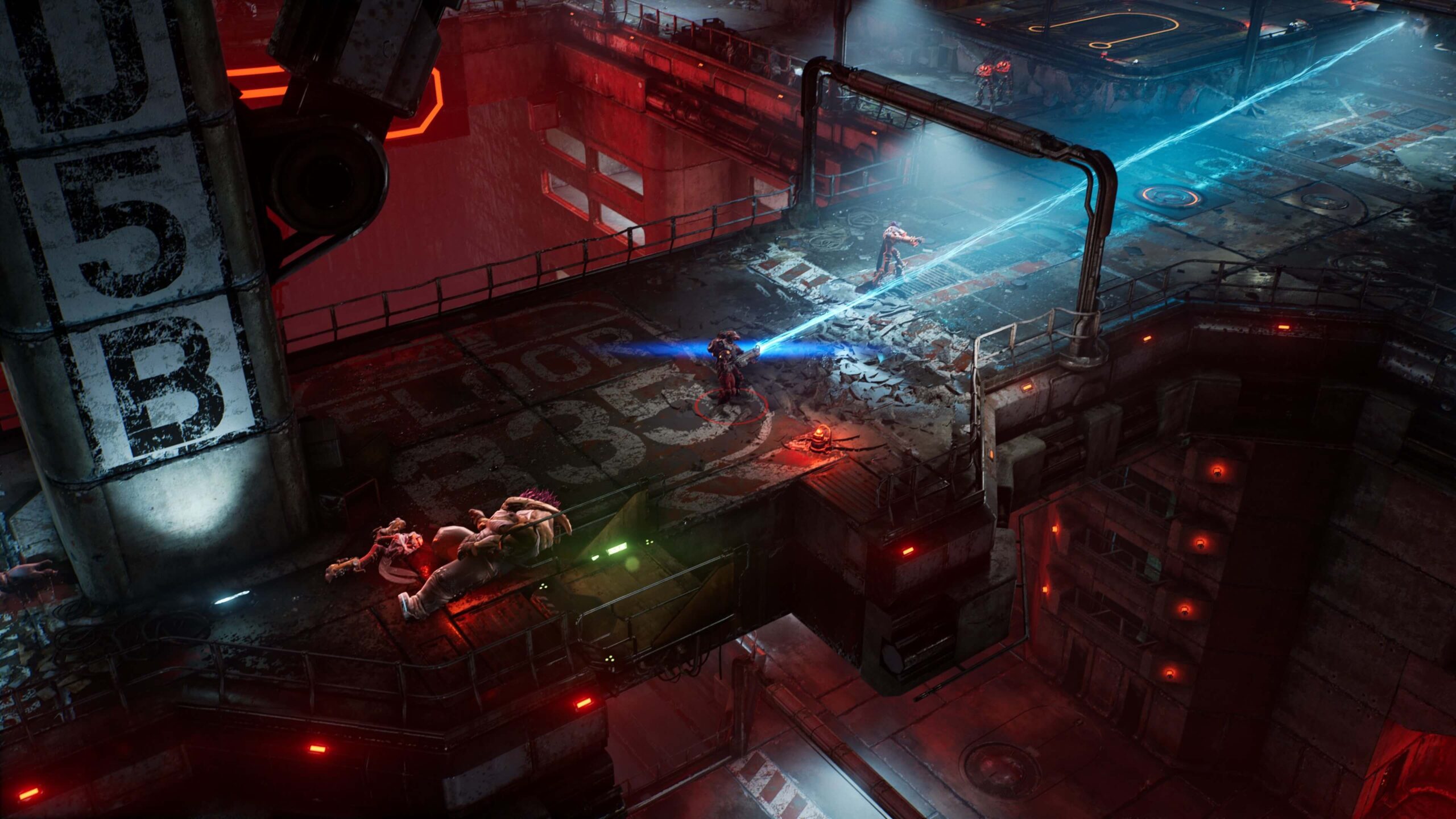
| Developer | Release Date |
|---|---|
| Neon Giant | July 29, 2021 |
Despite the differences in perspective, with Cyberpunk 2077 taking on a first-person view and The Ascent offering an isometric perspective, both games offer their players a highly immersive cyberpunk universe. Sharing key attributes like extensive character customization and implantable cybernetic enhancements, the player’s journey is significantly defined by their character build and choice of augmentations.
In both titles, the gameplay is deeply rooted in combat, although their execution differs significantly. The Ascent operates as a twin-stick shooter with a cover mechanic and high-low aim differentiation, while Cyberpunk 2077 best weapons offer a more comprehensive combat experience, from the best melee weapon attacks to an array of ranged weapons, each with unique attributes.
The Ascent’s destructible environment and Cyberpunk 2077’s open-world metropolis of Night City share a dynamic nature, reacting to players’ actions. Night City and The Ascent’s unnamed city both comprise different districts each with unique socio-economic statuses and gang affiliations.
However, Night City’s branching dialogues and experience-based progression system seem to provide a more sophisticated narrative structure compared to The Ascent. Also, despite the in-depth worldbuilding, the former has been criticized for a lack of exploration of its societal themes and lackluster portrayal of trans representation.
Pros
- The fast travel system expedites the in-game movement
- A destructible environment enhances immersion
- Local co-op and online co-op for shared gameplay
Cons
- Lack of in-depth narrative progression
- Limited to combat-focused gameplay
- The Ascent’s representation and inclusivity are unexplored
8. Ghostrunner
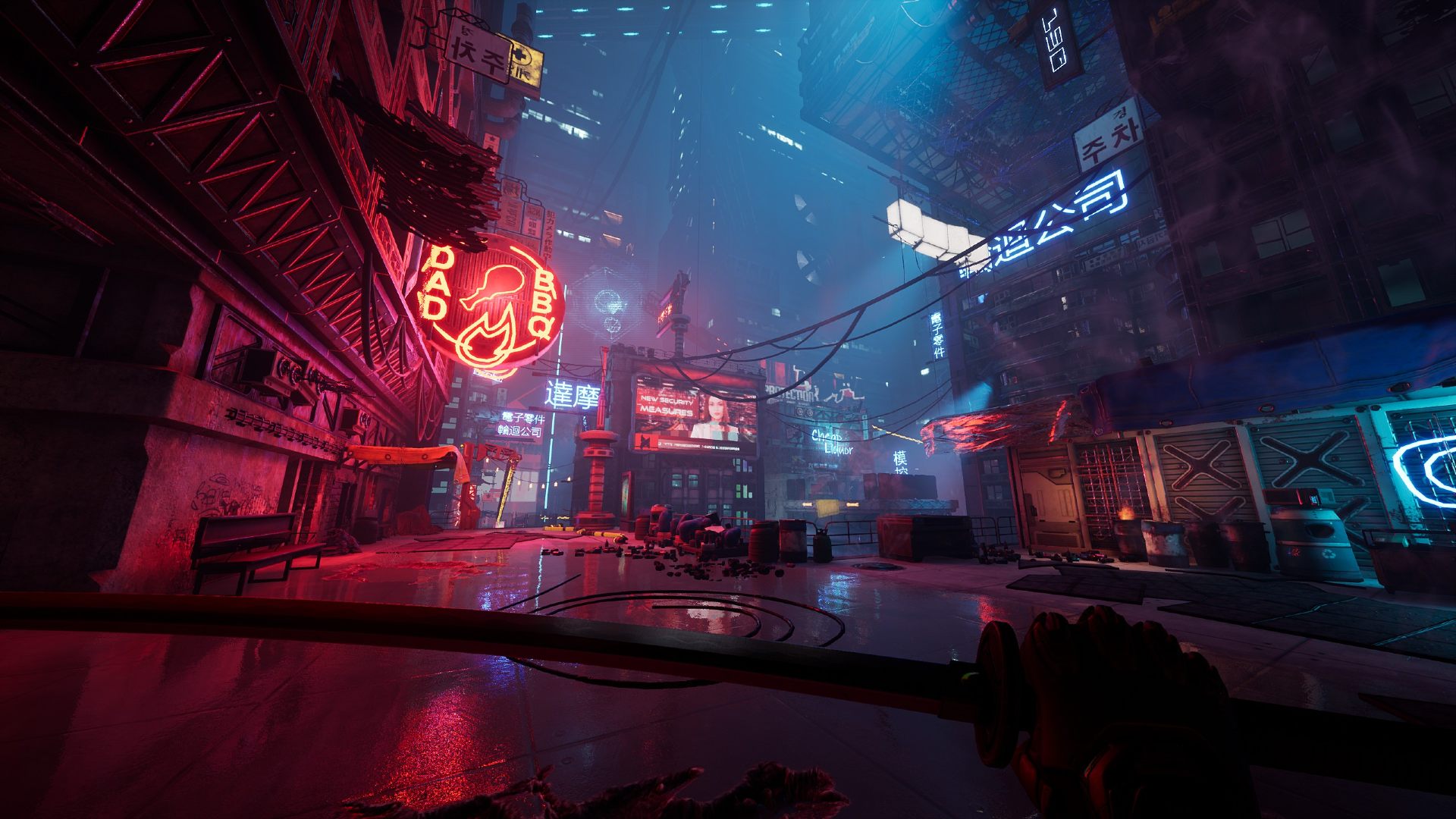
| Developer | Release Date |
|---|---|
| One More Level, Slipgate Ironworks | October 27, 2020 |
Decision-making that influences the storyline is a key feature of games like Cyberpunk 2077, and this is an opposite feature you will notice in Ghotrunner. When comparing the breathtaking Cyberpunk 2077 with Ghostrunner, the similarities are evident in the underlying themes of a cybernetic future teeming with action, but they differ in their gameplay mechanics.
“Cyberpunk 2077” is an action RPG with a multitude of customizable elements and player classes, allowing for a more tailored gaming experience. In contrast, “Ghostrunner” centers its gameplay on intense speed and agility as players control Jack the Ghostrunner, dashing and jumping through precarious environments.
Both games indulge in a cyberpunk setting, but they differ in their narrative depth. While “Cyberpunk 2077” presents an open-world metropolis with branching dialogue and numerous quests, “Ghostrunner” focuses on a more linear storyline, effectively delivered without interrupting the gameplay flow.
“Ghostrunner” stands out with its one-hit-kill mechanic for both player and enemies, in contrast to “Cyberpunk 2077’s” wider range of combat options, including non-lethal outcomes. However, “Cyberpunk 2077” invites players to immerse themselves in a rich world, explore the intriguing side quests, and navigate through the complex relationships with the title’s characters.
“Ghostrunner” is a different beast, designed for those who enjoy quick-paced, high-stakes combat with less emphasis on dialogue and world exploration. The storytelling in “Ghostrunner” is in motion, always accompanying the thrilling gameplay, unlike “Cyberpunk 2077” where a significant part of the narrative unfolds through character interactions and exploration.
Pros
- Intense, fast-paced gameplay
- Engaging, mid-action storytelling
- The fluid movement and combat mechanics
- Straightforward, high-stakes combat
Cons
- Limited to the one-hit-kill mechanic
- Fewer customization options
- Less narrative depth
- Lack of open-world exploration
7. Deus Ex: Mankind Divided
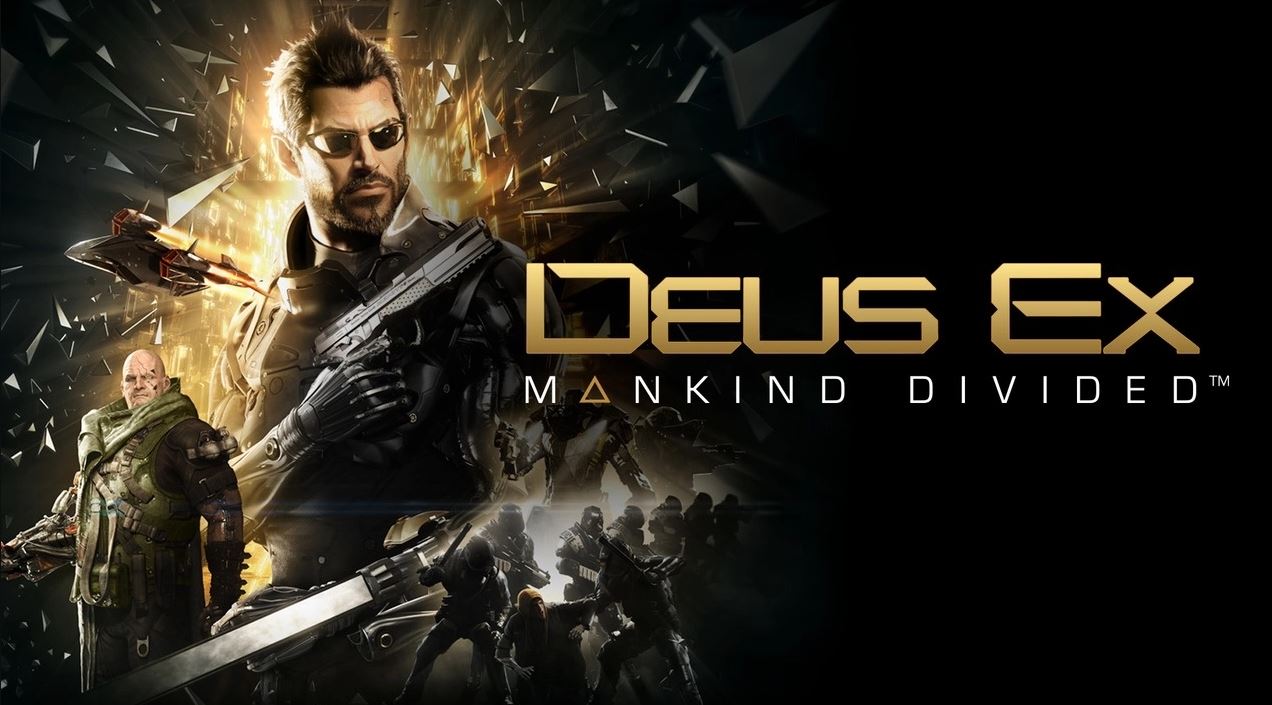
Related: Deus Ex: Mankind Divided Tips For Novice Players
| Developer | Release Date |
|---|---|
| Eidos-Montréal | August 23, 2016 |
As an action role-playing game with first-person perspectives, Deus Ex: Mankind Divided mirrors several gameplay aspects of Cyberpunk 2077, particularly in character augmentation, player interactivity, and choice-driven narratives. Just like V in Cyberpunk 2077, Adam Jensen in Deus Ex is a customizable character, augmented with cybernetic implants.
Both games facilitate non-lethal options, thereby underlining player choice and gameplay flexibility. Deus Ex’s unique social augmentation, allowing players to better gauge NPC reactions, somewhat mirrors Cyberpunk’s Braindance, enabling players to experience others’ memories.
The hub-like open-world structures of Deus Ex, although not as sprawling as Cyberpunk’s Night City, present intriguing possibilities. Its use of stealth mechanics, black-market equipment trading, and versatile cover system echo Cyberpunk’s tactical gameplay style. However, the inclusion of more explicit hacking minigames in Deus Ex presents a more nuanced approach to quick hacks in Cyberpunk 2077.
Deus Ex’s “Breach” mode is a distinct offering, contrasting with Cyberpunk 2077’s adherence to a single-player narrative. This mode offers an arcade-style game, complemented by leaderboards for score comparisons, an absent feature in Cyberpunk 2077.
Pros
- Nuanced hacking minigames
- Versatile conversation options affecting gameplay
- Unique “Breach” mode with leaderboards
Cons
- The smaller game world compared to Night City
- Fewer customization options for the protagonist
- Absence of dynamic weather affecting NPC behavior
6. Dex

| Developer | Release Date |
|---|---|
| Dreadlocks Ltd | May 7, 2015 |
The cyberpunk genre is richly represented through games like Cyberpunk 2077, and this is something you will get to explore in the 2D-word of Dex. Unlike Cyberpunk 2077’s first-person perspective, Dex offers a 2D world, resulting in a unique, yet equally immersive cyberpunk atmosphere.
Both games provide the player with a plethora of customization options, skills, and potential upgrades, but Dex’s system seems simpler with a focus on fighting, shooting, hacking, and lock-picking. The combat in Dex, however, feels less satisfying and impactful compared to Cyberpunk 2077’s system with its plethora of ranged weapons, melee combat options, and various damage types.
In terms of story, Dex also lacks the depth of character and world-building seen in Cyberpunk 2077, with its branching dialogues and companion characters. However, Dex does shine in its freedom to tackle missions in multiple ways and clever, thoughtful level design. Like Cyberpunk 2077, it explores themes of megacorporations and rampant inequality but does not delve as deeply into these themes as Cyberpunk 2077.
Pros
- Freedom to approach missions creatively
- Rewarding leveling system
- Well-realized cyberpunk world
- Clever, thoughtful level design
Cons
- Stereotyped NPCs and content
- The less satisfying combat system
- Uses very familiar cyberpunk tropes
- Animations are a bit janky
5. Observer: System Redux

| Developer | Release Date |
|---|---|
| Bloober Team, Anshar Studios | November 10, 2020 |
Taking a journey into the dystopian metropolises of Cyberpunk 2077 and Observer: System Redux reveals striking parallels in the worlds they’ve constructed. Both games share a rich cyberpunk aesthetic, defined by neon-lit landscapes, gritty urban sprawls, and a pervading sense of dread born from social inequality and corporate exploitation. However, Observer: System Redux takes a notably different approach to gameplay, shifting from action RPG to an exploration-focused survival horror.
The gameplay mechanics in Observer: System Redux lean heavily into environmental interactions, calling upon the player to meticulously explore the world, much like in Gone Home or What Remains of Edith Finch. As opposed to the gun-fueled combat of Cyberpunk 2077, the absence of overt physical threat in Observer fosters a unique sense of dread, with its horror being psychological and atmospheric, rather than confrontational.
In terms of narrative, Observer: System Redux mirrors the enigmatic and open-ended storytelling found in Cyberpunk 2077’s side quests. Both games create memorable narratives, employing branching dialogues, player choices, and quests that have a significant impact on the storyline.
Despite the dystopian genre shared by both games, Observer: System Redux takes a more intimate approach, focusing on a single, derelict apartment building rather than a vast cityscape. Furthermore, the ‘dream eater’ sequences offer a unique gameplay element, drawing on the imaginative and hallucinogenic exploration of characters’ memories.
Pros
- Deep, psychological horror without relying on combat
- Strong narrative with choices that impact the story
- Exploration-based gameplay encourages thorough world interaction
Cons
- Darkness can obscure details, despite enhanced visuals
- The focus mechanism may feel clunky and obstructive
- Replayability may be dampened by repetitive stealth sections
4. Witcher 3
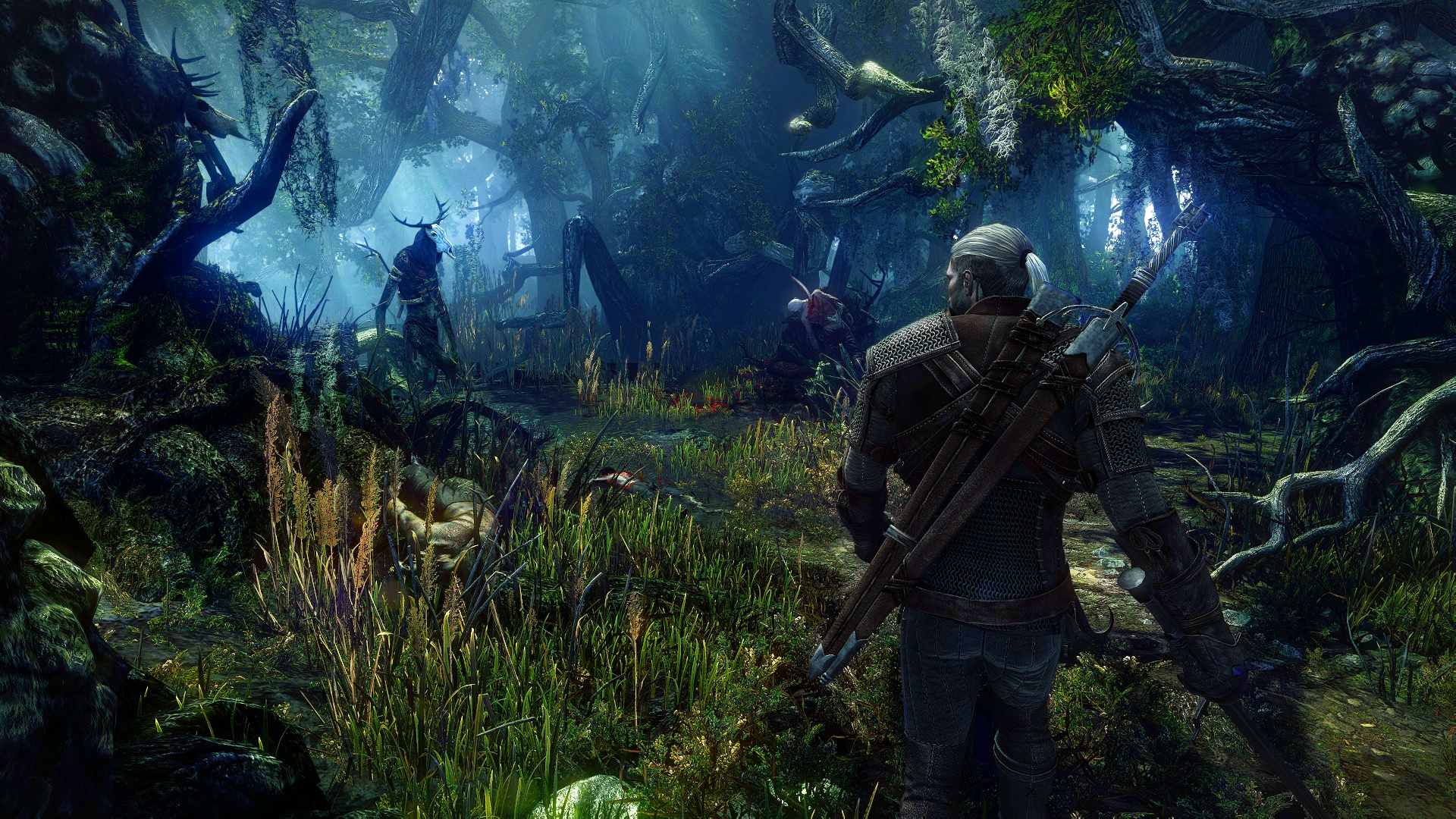
| Developer | Release Date |
|---|---|
| CD Projekt Red | May 19, 2015 |
Though Cyberpunk 2077 and The Witcher 3: Wild Hunt are developed by the same studio, CD Projekt Red, they showcase varying narrative and gameplay elements. Futuristic technology and mega-corporations often form the backdrop in games like Cyberpunk 2077, and this is something you will not find in The Witcher 3.
Besides that, both titles are action role-playing games, but Cyberpunk is set in a futuristic metropolis, while The Witcher is in a fantasy world. Cyberpunk 2077 uses a first-person perspective and futuristic gadgets, with an emphasis on customizable cybernetic enhancements and gear rarity.
The gameplay of Witcher 3 is more traditional, employing a third-person perspective, steel swords, crossbows, and magical abilities. Moreover, Witcher 3’s dynamic environment, where the day-night cycle can influence enemies’ power, mirrors Cyberpunk’s dynamic weather system affecting NPC behavior. However, both games are rich in side quests, which prove to be some of their best aspects.
However, in terms of the narrative and worldbuilding, Cyberpunk 2077’s dystopian future feels more superficial and less substantiated in its socio-political commentary, compared to the morally complex universe of The Witcher 3. Witcher 3’s dialogue tree offers multiple endings and a robust romantic subplot, which is less pronounced compared to Cyberpunk 2077 secret ending.
Related: BEST Runewords In The Witcher 3
Pros
- Enhanced AI and dynamic environment
- Rich narrative and a morally complex universe
- Wide variety of weapons, spells, and upgrades
Cons
- Items and weapons require regular repair
- Stamina limits the usage of magical signs
- Some enemies might become too powerful depending on the day-night cycle
3. Bioshock

| Developer | Release Date |
|---|---|
| 2K Boston, 2K Australia | August 21, 2007 |
Both Cyberpunk 2077 and BioShock offer a rich first-person experience with role-playing elements, although they take place in entirely different worlds. Where Cyberpunk 2077 thrives on its futuristic metropolis, Night City, filled with cybernetic modifications, BioShock dives deep into the underwater dystopia of Rapture, introducing biogenetic enhancements called plasmids.
In terms of gameplay, both games offer a variety of ways to tackle challenges. Cyberpunk 2077 lets you customize your character’s abilities through cyberware implants and class-based stats, allowing a broad range of approaches from hacking to combat.
Similarly, BioShock provides options from direct combat to stealth tactics, using plasmids to manipulate enemies or environments. Both games include a hacking mini-game, although BioShock’s pipe-puzzle approach differs from the more technically styled hacking in Cyberpunk 2077.
While Cyberpunk 2077 lets you traverse a sprawling cityscape on foot or by vehicles, BioShock’s exploration is more confined, yet no less intriguing. Both games feature a day-night cycle or dynamic environment that affects non-player characters’ behavior.
Despite their distinct settings, both games touch upon the theme of societal degradation under corporate rule, however, Bioshock tends to delve deeper into this theme, while Cyberpunk has been criticized for its superficial exploration of such themes.
Pros
- Deep exploration of societal themes
- Innovative use of plasmids and environment interaction
- Engaging hacking mini-game
Cons
- Confining exploration compared to open-world games
- Limited combat choices in comparison
- Dependence on specific items (EVE) for plasmid use can restrict gameplay
2. Dishonored 2
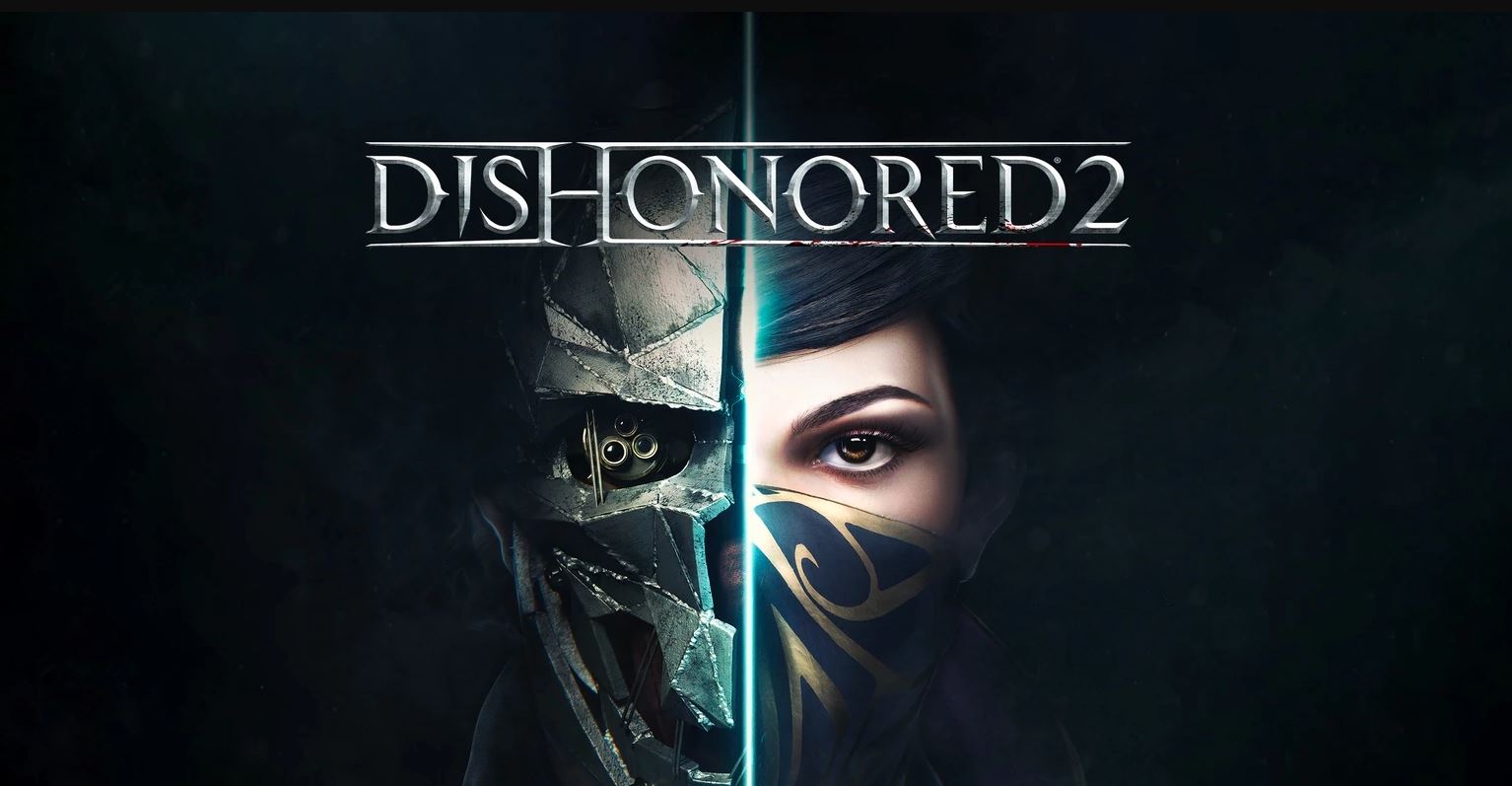
| Developer | Release Date |
|---|---|
| Arkane Studios | November 11, 2016 |
Games like Cyberpunk 2077 often have unique gameplay mechanics that contribute to diverse player experiences, and the robust features found in Dishonored 2 mimics CD Projekt Red’s game. Dishonored 2, much like Cyberpunk 2077, is an action-packed, first-person perspective game with a variety of combat and non-combat options for character progression. Both games provide players with a plethora of customization options and a vast open world to explore.
They offer a non-linear play style, with Dishonored 2’s line-of-sight stealth elements akin to the cover and stealth mechanics of Cyberpunk 2077. Furthermore, both games emphasize player choice, allowing the title to be completed without killing anyone and even offering non-lethal weapon options.
However, where Cyberpunk 2077 uses a futuristic, cybernetic setting, Dishonored 2 relies on a more classic, stealth-based approach, powers, with the additional mechanic of the chaos system that changes the world dynamically based on the player’s actions. Unlike Cyberpunk’s more detached approach to worldbuilding, Dishonored 2 provides context and consequence to the player’s actions.
Pros
- Stealth-focused gameplay encourages strategy
- The chaos system adds depth to player choices
- Varied and interesting non-lethal combat options
- A unique theme for each level adds a variety
Cons
- Less customization compared to Cyberpunk 2077
- A chaos system can make gameplay feel punitive
- Limited in terms of cybernetic upgrades and abilities
- The world may feel less immersive than Cyberpunk’s Night City
1. The Elder Scrolls V: Skyrim
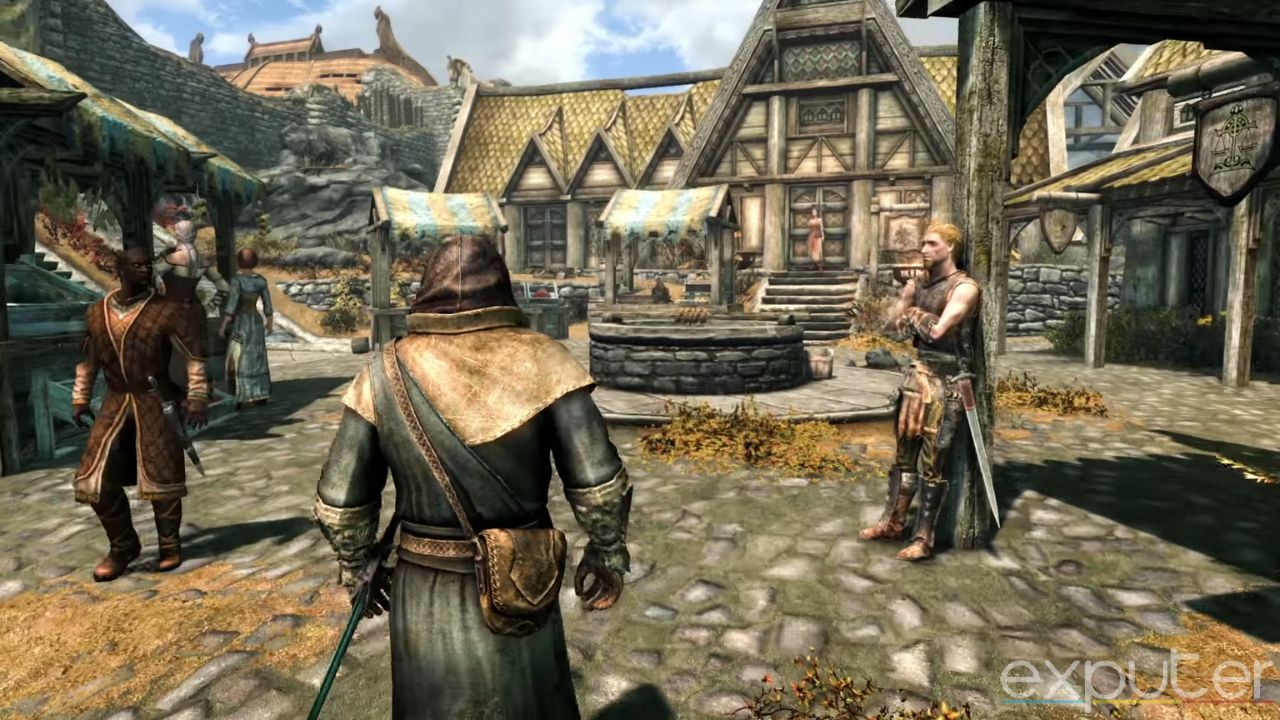
Related: BEST Merchants In Skyrim
| Developer | Release Date |
|---|---|
| Bethesda Game Studios | November 11, 2011 |
Comparing Cyberpunk 2077 with The Elder Scrolls V: Skyrim, it is evident that both games share some common core RPG elements, yet diverge significantly in theme, setting, and certain gameplay mechanics. Both games offer a character creation system that allows personalization in terms of physical appearance and background, enabling players to connect with their characters on a personal level.
They both feature an open-world exploration element, although the urban dystopia of Cyberpunk’s Night City contrasts sharply with Skyrim’s sprawling medieval fantasy environment.
The two games diverge notably in their narrative structure and tone. While Cyberpunk 2077 focuses on the harsh realities of a dystopian future ruled by megacorporations, Skyrim places the player in the role of a prophesied hero in a land of magic and dragons.
Both games offer side quests and non-linear story progression, but Skyrim tends to offer more in terms of character-based factions and guilds that the player can join. Cyberpunk 2077’s intricate use of cybernetic enhancements and tiered gear provides a unique twist on traditional RPG elements, contrasting with Skyrim’s more traditional, medieval-inspired health potions, bows, mage gear, one-handed weapons, and crafting systems.
Pros
- Immersive fantasy environment
- In-depth faction systems and guilds
- Flexibility in character progression
- Wide range of magic and weapons
Cons
- Some quests can be unobtainable if NPCs are killed
- Less emphasis on high-tech abilities
- Combat may feel less dynamic compared to Cyberpunk 2077
- Graphics and UI can feel outdated
That is pretty much everything I had to discuss about Games Like Cyberpunk 2077. Before you go, you must visit BEST Games Like Remnant 2, Games To Play If You Like Final Fantasy 16, Games Like Aliens Dark Descent, and Games Like Street Fighter 6 guides.
Next:
Was this article helpful?
Thanks! Do share your feedback with us. ⚡
How could we improve this post? Please Help us. ✍






![Games Like Cyberpunk 2077 [Top 15] Games Like Cyberpunk 2077 [Top 15]](https://exputer.com/wp-content/uploads/2023/07/Games-Like-Cyberpunk-2077.jpg)
More Stories
Starfield dev claims some of the space RPG’s “planets are vacant by design and style – but that’s not boring”
26 many years afterwards, initial Fallout co-creator settles the RPG’s biggest discussion: who dropped the first nuke and why?
The Elder Scrolls 2: Daggerfall approximately destroyed Bethesda: “If you were not putting in 60 hrs minimum amount, your career was in danger”